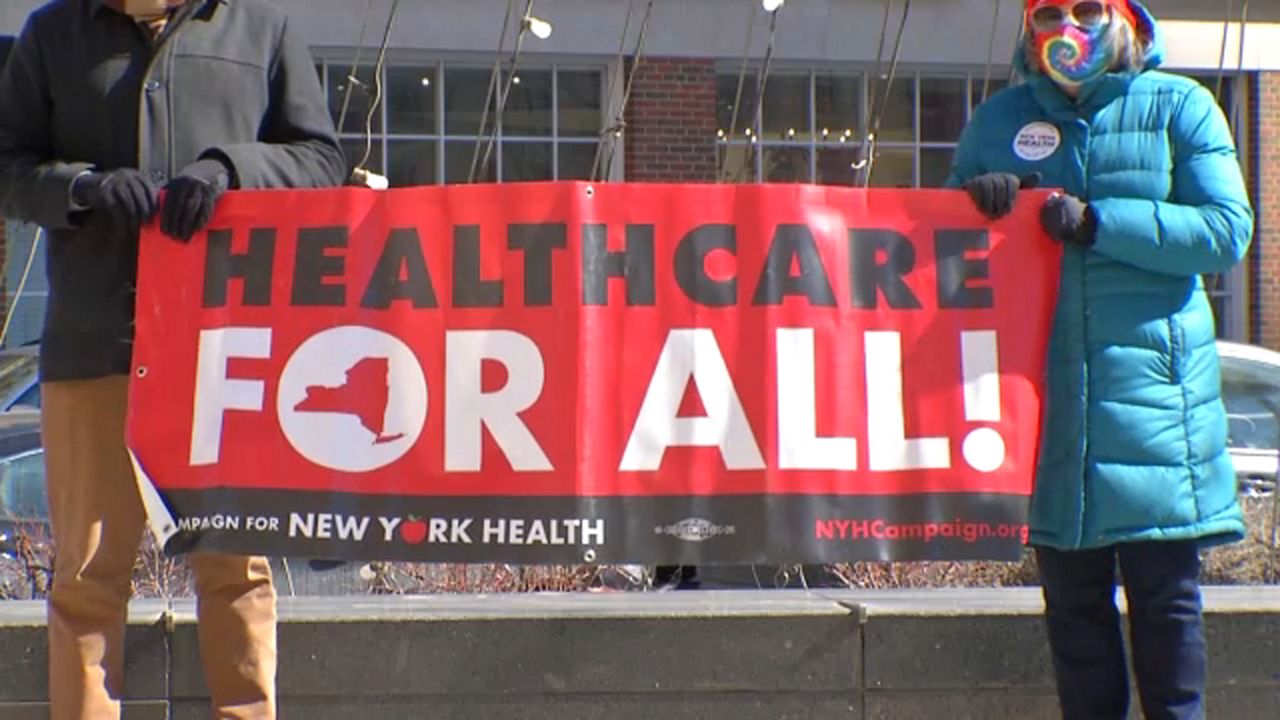Assembly Democrats in the Codes Committee voted along party lines Tuesday to advance the New York Health Act to establish a statewide single-payer health care system, but not without challenges by Republicans.
Democrats in the 21-member committee, excluding Assemblyman Steven Cymbrowitz, of Brighton Beach, voted to send the measure to the Ways and Means Committee scheduled to meet noon Wednesday.
Republican assemblymembers unanimously voted against the bill, citing concerns of increasing costs on taxpayers.
The bill, sponsored by Assemblymember Rick Gottfried and Sen. Gustavo Rivera in the upper house, outlines the administrative structure, payment methodologies, care coordination and health care provider negotiations for a single-payer health system for all state residents. The measure would also create the New York Health Trust Fund from a variety of state and federal sources to finance the plan.
Before committee members voted Tuesday, Assemblymember Angelo Morinello asked about state Comptroller Tom DiNapoli's analysis last week of the record-breaking $220.5 billion 2022-23 budget where he urged caution about the state's ability to sustain that level of spending with last year's higher-than-expected tax revenues and one-time federal pandemic assistance.
"Has that been taken into consideration?" Morinello asked.
He blasted Democrats for advancing a taxpayer-funded plan on the heels of the comptroller's questions about an unsustainable budget in the future.
"That has not been reviewed with this bill, but that is something we will look into," a staffer on the bill sponsor's health team said during the meeting. "I'm sure the Ways and Means Committee will also be analyzing that as well."
The Ways and Means Committee will review the bill's potential statewide financial impact.
"That's where those issues would presumably be taken up," Codes Committee Chair Assemblyman Jeffrey Dinowitz replied.
The Health Act is estimated to have a net savings of $11.4 billion by eliminating insurance company profits and reducing administrative and prescription drug costs, according to a brochure about the bill from co-sponsor Sen. Robert Jackson's office.
Morinello, a Republican from Niagara Falls, was the sole member of the Codes Committee on Tuesday to challenge Democrats on advancing the measure. He also probed how recently the analysis of the bill's projected cost savings was performed.
The Health Act's latest financial estimates were determined within the last two or three years, the health team staffer said during the meeting.
Morinello also challenged his colleagues about pay for unionized health workers and compensating organized labor for the givebacks they've provided in exchange for better health benefits over the years.
"The [Health Act] would allow unions to focus on negotiating better wages and they could since they would no longer have to focus on negotiating health benefits under this bill," the aide with the sponsor's health team replied, adding the bill does not outline specifics about compensation for unionized workers.
"...The bill would allow collective bargaining to better focus their efforts for their members," she said.
Other assemblymembers and staffers did not have an answer about performing an analysis to estimate the average amount each unionized health worker in New York has spent to secure better benefits.
Employers would be mandated to pay at least 80% of the tax on payroll under the Health Act, but a higher percentage can be negotiated. State residents who are self-employed would be required to pay the complete insurance premium.
The Realities of Single Payer coalition, made up of 164 organizations in favor of a combination of private and government-funded health insurance, issued a statement ahead of Tuesday's Codes Committee meeting urging legislators to oppose the Health Act.
"The New York Health Act – legislation to force a Single Payer, Albany-run plan on every single New Yorker – has been a bad idea since it was first introduced 30 years ago," members of the Realities of Single Payer said. "...Instead of forcing more than 18 million New Yorkers into an untested system that will triple their taxes, legislators should focus on covering the remaining adults who lack health insurance and make coverage more affordable for all."
The coalition argued the state's number of uninsured has dropped under 5%, noting the state's universal health care policies for senior citizens ages 65 and older, children through age 19 and pregnant women and new mothers.
More than 1 million New Yorkers do not have health insurance.
The Health Act has sat in the Senate Health Committee since Jan. 5.
The single-payer state health system would cover in-home and institutional care, including hospice.
Lawmakers have introduced and attempted to pass a version of the New York Health Act for more than two decades.


